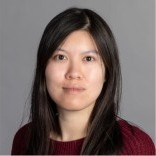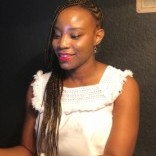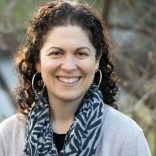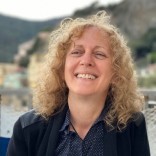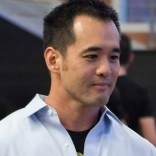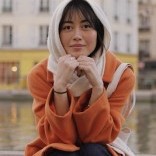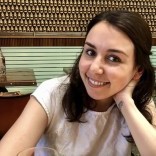Yeah, Sure
Melissa Darcey Hall
They entered the gates of the county fair and Margaret knew she had a long day ahead of her. The top half of the Ferris wheel rotated as slowly as the minute hand of a clock. Her date, Henley, had been talking for the last five minutes and told her he was a feminist, but.
“It doesn’t have to be so in your face,” he claimed.
Margaret nodded. If she questioned him, she worried she would only prove his point. Henley took this as a sign to continue.
“I read that Eileen book you mentioned loving, and I don’t get the appeal of ugly protagonists. I mean, Eileen was disgusting, wearing her dead mother’s clothes. It feels like the author did it to be edgy.”
Margaret should feel flattered that he’d read a book he knew she liked. It was a man’s way of showing he cared. Or at least a Seventeen magazine article she’d read as a teenager said something along those lines.
“I think she was more self-loathing than deliberately offensive,” Margaret offered, but Henley had already moved on from the conversation, searching the fair map for the food stand that sold deep-fried jelly beans.
This was Margaret’s first date with Henley. They both worked at a small company that sold vending machines and break room supplies to other companies. Business was booming ever since Inc. Magazine published an article about increasing employee retention with free snacks and a stocked fridge. It was cheaper than offering higher pay or decent health insurance, and gave a company the illusion of being a fun, energetic, and modern place to work, as if a college graduate’s desire was to drive to an office each morning for a free cup of coffee and a bag of Funyuns. But such was the modern workplace, or so all late-twenty-somethings like Margaret had been brainwashed into believing.
Margaret worked in the marketing department, and Henley worked in sales. Although they had worked in the same office for three years, they’d only started flirting with each other a couple of weeks ago. It started when their boss threw a Cinco de Mayo party, though “party” was a bit too generous. It was more of an after-work hangout in the break room. A portable Bose speaker played Camila Cabello while the CEO’s wife blended strawberry margaritas in a KitchenAid mixer.
Henley and Margaret were both buzzed from the alcohol and warm from the comfort of the approaching weekend. Henley pointed out Margaret’s fuchsia socks, claiming he’d never met a grown adult who wore such bright colors on their feet. Margaret asked him why he was named after a shirt.
“Huh?” he said.
“You know,” she said. “The ones with those buttons at the front.” She didn’t understand the point of henleys. They were odd, as if a man needed the option to show some cleavage or air out his hairy chest.
“You’re weird,” he said, and Margaret nodded gravely, as if he’d diagnosed her with some terminal illness. “I like weird. I like you.”
Incredible, Margaret thought, the impact a single compliment can have on one’s life. Like ending up at a fair searching for deep-fried jelly beans. This phenomenon needed a proper name; something one could read about in a book and learn how to avoid. Margaret would offer herself to science as Case Study A.
Henley located the deep-fried jelly beans stand on the map.
“I read about them online. So innovative. The combination of salty and sweet, gummy and crispy.” He grinned. “Wanna try them?”
Margaret hated jelly beans, but she had to ration out her disappointments today and she wouldn’t waste one on Easter bunny candy. She could be moody, she knew. More than a few people in her life had accused her of PMSing when it wasn’t even her time of the month.
“Yeah, sure,” she said, and Henley beamed. He reached for her hand and she let him guide her deeper into the cacophony of the fairgrounds. They walked down a path lined with booths selling shoe polish and massage chairs and old license plates refashioned as signs with quotes like TEENAGERS ARE GOD’S PUNISHMENT FOR ENJOYING SEX. One moment, Margaret heard the synthesizer of a Justin Bieber song, and the next, the twang of an unfamiliar country ballad.
Margaret never liked the fair. It was loud and crowded and all the food was coated in a film of oil. Even the pizza was deep-fried. She tried to remember how Henley had convinced her to go, but then she remembered: he said wanna go to the fair and she said yeah, sure.
Margaret’s amenability had caused problems for her in the past, and it would again in the future. Like agreeing to this date, for instance. Sure, they’d flirted. There’d been heat generated in a chilly office. But Margaret had to walk past Henley’s cubicle in the sales pit (the departments all had their own animal habitat names) to reach her desk in the marketing den. If their date didn’t go well, she’d have to pass by him each day with her head lowered in shame.
She could imagine it now: the sales guys (all seven were men) huddled in a low whisper when she passed them twice a day. Possibly more often, if she had to use the bathroom or refill her water bottle. The sales guys were bigger gossips than Perez Hilton, and as loyal as a tech bro to his Patagonia vest. On Mondays, they went out for lunch at a bar where some busty blonde they liked worked, and came back mildly drunk and raucous.
Henley had seemed different, though. Smarter and more thoughtful. But it wouldn’t have been the first time she’d convinced herself of a personality trait that wasn’t really there and only in her imagination. It was the same imagination in which she pulled off bangs.
When they reached the jelly bean stand, Margaret saved them a bench while Henley stood in the five-person deep line. She sat and stared at a poster for a piglet race that promised a squealing good time.
“This is going great,” Margaret said aloud to no one. “This is a wonderful day.”
The power of positive thinking and all that. She tried to reframe some of the earlier awkward moments as harmless banter. Their date hadn’t started well this morning. Margaret had agreed to meet Henley at a grocery store so they could carpool to the fair’s paid parking lot. Henley was twenty minutes late, so Margaret stood in the parking lot like an abandoned child, scanning the horizon for his obnoxiously bright blue Corolla that reminded her of the Pop-Tarts box. When he finally arrived, he honked twice and told her to hurry up and jump in, as if she was the one who’d held them up.
They’d agreed to split the cheapest parking option: a ten-dollar lot across the highway that required a fifteen-minute shuttle ride to reach the fair’s front gates. There were two other parking options: twenty dollars for general parking on the fairgrounds, and fifty dollars for preferred parking just feet away from the entrance. As they sat on the bus that shuttled them from the dirt lot to the fairgrounds, Margaret observed the dozens of rows of cars in the general and preferred lots. It was like a view of all the social classes in a neat order, from the dusty Toyotas and dented Hondas in the back to the Teslas and Audis at the front.
Margaret said as much to Henley, who frowned and said, “well, if they didn’t do that, everyone would try to park up front.”
“What’s so bad about that?”
“Chaos, Margaret! Hierarchy keeps the masses in line,” he said, patting her knee.
“Then maybe we should all wear color-coded wristbands to denote our place in society.”
“What are you, Margaret, some kind of socialist?” Henley asked. It was the first time he’d ever shown a hint of revulsion toward her.
She could tell him about an article she’d read on Jacobin about the modern feudalism of landlords, but she didn’t want to appear snooty. Previous dates had told her she was prone to theoretical rants and notions of idealism. They always seemed to think she’d majored in philosophy just so she could pretend she was smarter than everyone else. So instead, Margaret laughed at Henley’s comment and asked him what he wanted to see first when they got to the fair.
Now, as Henley paid twelve dollars for a cardboard boat of deep-fried jelly beans, Margaret tried to remember why she’d found him attractive. He looked different away from the office backdrop with its fluorescent lights and dull, gray cubicle walls. Less polished than she remembered (though maybe she was too critical of the mustard stain on his shirt). Less interesting and desirable. This was a man who had made her laugh. At least twice! Who had watered the Ficus at her desk when she missed a week of work because of a nasty sinus infection.
The office, she was certain, released some kind of pheromone to trick people into contentment. It was a capitalist con job to make employees desire the nuclear family and white picket fenced houses; a distraction from realizing they were selling minutes, hours, days, years of their life for digits on a bank statement.
They ate the deep-fried jelly beans. They were as terrible as Margaret expected, but Henley loved them.
“The blend of salty oil and fruity sweetness is so disgusting it redefines the definition of deliciousness and surpasses categorization of edibility,” he said. Whatever that meant.
“Do you ever wish you could redo everything in your life?” she asked.
“What do you mean?”
“Well, you could go back in time and study food or something and become a food critic.”
Henley picked at his teeth with his index finger and nibbled on the remnant of a jelly bean.
“I’m happy with my life. Aren’t you?”
“I don’t know.” Margaret looked away from Henley. She couldn’t stand to watch him pick at his teeth a second longer.
“How do you not know? You either do or don’t.”
“Sometimes I think pretending to be happy is less demanding than genuine happiness,” Margaret said. “You just nod along and let someone else make all the decisions. It’s like that kid’s game, follow the leader. You just do whatever the leader does, and if you’re really good at it, you win the game. But the problem with that is, after a while, you forget what you even want and it’s like you wouldn’t even know how to decide things again. You forever need someone else to tell you what you want and what to do.”
Margaret scanned the booths surrounding them. All of them promised a superlative. The most comfortable pillow. The world’s biggest onion ring. The softest slippers. She felt dizzy from all the noises and false promises and battling smells. Waffle cones. Garlic fries. Bacon-wrapped hot dogs.
“That’s really dark, Margaret,” Henley said. He had that repulsed look on his face again. “Have you considered seeing a psychiatrist?”
“Maybe I should ask that tarot reader over there,” Margaret said, pointing at a booth across the way. It was the only booth that didn’t promise something life-changing, simply offering a three-card spread for twenty dollars and a Wheel of Fortune spread for fifty. A raven-haired woman wearing a tangerine muumuu sat behind the booth, filing her nails. A tarot deck sat neglected on the wrinkled purple tablecloth.
“Those things are scams. I hope you don’t believe in that kind of nonsense.”
Margaret nodded, even though she disagreed. She had her palm read once years ago. Apparently, she had the very rare circle sign on her mount of Mars. “Is that good?” Margaret had asked. “No. Terrible,” the palm reader told her. “You are weak-hearted and indecisive.” Margaret pulled her hand away as if scalded by boiling water. She searched for the circle on her palm. She couldn’t see it, but the premonition vibrated in her gut with an acute accuracy.
Margaret knew nothing about tarot, but she wouldn’t mind some guidance from an objective stranger who had no stake in her life. Someone who could wake her up and jolt her into action. All of her decision-making so far in life had led her to a boring desk job and a bad first date. Maybe someone else had a better solution.
She imagined collapsing into the metal chair, shoving fifty dollars at the woman, and demanding she reveal everything she could about Margaret’s life, past, present, and future. “You think you can handle it?” the woman would ask. “God, no,” Margaret would say, but she’d promise to listen to and obey everything the woman told her.
Henley ushered Margaret past the tarot booth, and as they walked toward the Ferris wheel, they exchanged and collected information like a game of Go Fish. Do you have any siblings? Were you also born in California? Do you prefer cats or dogs? Henley gave perfectly fine answers, and yet they infuriated Margaret with their banality. For each answer he gave, he threw another question at her. What was the best ice cream flavor? Beach or mountains? What was the exact number of items that tipped the scales from collecting to hoarding? They were the questions an extrovert allergic to silence asked to pass the time.
As Henley explained his essentials for survival on a desert island—nail clippers, a memory foam pillow, and the Tomb Raider video game—Margaret fantasized about how many bones she’d break if she threw herself from the top of the Ferris wheel. It was clear that his flirting during that Cinco de Mayo party resulted from alcohol, and not some animalistic heat between them. Margaret had confused the mystery of the unknown for sexual chemistry. Now she’d learned everything about him to know she wasn’t interested.
“I’ll get the tickets. You wait in line,” Henley told her when they reached the Ferris wheel.
From a distance, the Ferris wheel had appeared sturdy and magnificent, its cherry red paint glimmering under the sun. At night, with its blinking lights against the backdrop of a blue summer sky, it might even look romantic. But up close, the Ferris wheel was grimy, the paint chipped and faded in spots. It wasn’t particularly tall or special at all. Only a rickety amusement ride, likely overdue for maintenance or retirement. Henley would wrap his arms around her head to protect her if it fell or crashed or whatever Ferris wheels did when they were missing a few screws. At the very least, he was a nice guy.
She observed Henley as he approached the ticket booth a few feet away.
He was fine looking. Really! She wasn’t the vain type! Swear to God! There was nothing wrong with him, and yet she didn’t like him. His voice was monotone, too similar to the voice of a documentarian discussing quantum physics. His favorite books were the type of Westerns where all the women were described as having ample bosoms. When he spoke, he sucked in air between his two front teeth. If they started dating, they would never break up because she would have to be the one to initiate it, which would make her look bad, and they’d end up married and she’d never have an orgasm again in her life.
Margaret was nearly to the front of the line by the time Henley purchased the tickets. He jogged over to her, panting more than what felt appropriate for such a short distance. A Rorschach blot of sweat spread across his t-shirt near his armpits. As they stood, waiting to slide into the next available cabin, Henley placed a stiff hand on her lower back. They stood like that for a painfully endless minute until the ride attendant gestured for them to climb into the cabin.
The Ferris wheel cabin lurched forward before ascending on its slow crawl toward the sky. They sat close together, their legs touching. Henley extended his arm out and across Margaret’s shoulders and started talking about how there were no good movies anymore.
“They only make superhero sequels and remakes of eighties comedies. Or war epics where a soldier rescues a dog, or a lost child. Have you noticed that?”
Margaret stifled a yawn. “I guess.”
“All the spy movies are half-solved puzzles. And don’t even get me started on CGI. It has totally cheapened the magic of filmmaking. I don’t know if you saw The Flash, but–”
Henley talked about the politics of the movie industry until the Ferris wheel jolted to a stop, Henley and Margaret’s cabin perched at the top.
“What a view,” Henley said, but all they could see were fair booths and a parking lot.
“Hey,” he said, turning his head toward Margaret. He stared at her, as if assessing her in a police lineup. “You have brown eyes.”
Margaret had hazel eyes, but it would be rude to correct him when he’d sounded so confident. He leaned in to kiss her. Margaret watched it happen in slow motion. She thought about Jurassic Park. If you stood completely still, the tyrannosaurus wouldn’t notice you. Margaret froze and let his lips meet hers. They were wet from the sweat on his upper lip, and she felt the prickle of his uneven stubble. He pushed his tongue between her lips, and she let him explore her mouth for a moment before he finally retreated.
“Mm,” he said, with a smirk. His lips sat tight together and his cheeks flushed.
Margaret felt faint. It was the kiss you practiced on a pillow when there were no consequences for being terrible at it. Worse than the kiss, though, was realizing that if he tried to kiss her again, Margaret would let him.
It was too late now to turn back. She’d agreed to this date. She’d committed to weeks of flirting with him. In front of her coworkers! There were eyewitnesses! If she changed her mind now, everyone would call her cold, cruel, or—worse—a tease. There was one guy in the sales department who might even entertain labeling her a bitch. She’d be the girl who snubbed Henley; sweet, kind Henley, who everyone in the office loved.
After the Ferris wheel, Henley wanted lunch.
“Do you like pork? I was thinking ribs.”
“I’m a vegetarian,” she said.
Henley scrunched his nose. “Always?”
Margaret shrugged. “Pretty much.”
Perhaps Henley was a voracious carnivore, and Margaret’s stock value had dropped. She knew better than to get too hopeful.
“I have an idea,” Henley said. “We have ten minutes to each find the best looking lunch. Meet me back here by the Ferris wheel.”
Margaret disappeared into the crowd in the opposite direction of Henley, passing a handful of stands. Giant pickles on a stick. Donut cheeseburgers. Sushi burritos. Nothing looked as enticing as the fair’s exit in the distance, those beguiling metal gates offering her freedom.
Margaret weighed her options. She could leave, call an Uber, and ghost him the rest of the weekend. But then Monday would arrive and work would be unbearable. She’d never be able to face him, forced to crawl to her desk, hiding behind the cubicle walls. She’d have to quit and beg to work remote for her last two weeks, pretending she had some contagious disease or leg paralysis.
If she stayed, she could invent a reason for them to remain as friends. She was Catholic and intended on remaining a virgin. Her mother was dying and she couldn’t commit to a relationship right now. She was allergic to semen. Or she could make him dislike her. It would be much easier if he dumped her. The vegetarianism thing was one strike against her; the socialism a second. They could return to their conversation about Eileen and she could tell him what she really thought. Had he never heard of the Southern Gothic? Did he take equal issue with the monstrous men of Hemingway’s novels? It was a decent plan except that Margaret hated conflict and avoided it at all costs. Especially with men.
In college, she knew a girl whose date attacked her because she’d laughed at his hair. He’d bleached his tips for a Justin Timberlake circa early 2000s look because he knew she loved NSYNC. The guy pushed her against a wall, called her a bitch, and bruised her throat. Henley would never do that, though. He was too nice. The worst he’d do was cry or accuse her of radical feminism.
The most mature and least enticing option was to tell the truth. She wasn’t interested in him romantically, and it would be best for them to leave. But he’d want to know why—why she’d let him kiss her, why she’d agreed to this date, why she’d flirted with him—and she couldn’t bear telling him the truth.
“I’m not attracted to you!” she imagined shouting, surrounded by families licking melting ice cream cones as they witnessed one of those embarrassing dates you read about on Twitter; the kind that eventually gets made into a movie. “You’re boring and a terrible kisser. And what idiot brings a Tomb Raider video game to a desert island without a game console!” Everyone around her would boo her, call her vain and cruel for berating a perfectly nice guy.
No, she couldn’t go through with it. If she called it off now, she’d upset him and ruin his day. He’d have wasted money on a failed date. Margaret worried a lot about inconveniencing others, especially someone who’d spent money on her.
Several years ago when her last serious boyfriend, Edgar, broke up with her, he tallied up all the money he’d spent on her during their on-again-off-again five-year relationship and texted her the breakdown. It amounted to thousands of dollars. It wasn’t a bill, he told her. Only an example of how much he’d invested in her, and then she had the nerve to say she didn’t see a future with him. “You should have told me earlier,” he’d told her. “Instead of dragging this out forever.”
Margaret ignored the fair’s gates and bought a grilled eight-cheese sandwich and a lemonade. She couldn’t name eight different cheeses. It would make for good trivia when she met back up with Henley. Something to pass the time.
She faced the Ferris wheel, which sat a hundred feet away. In a week, a crew of burly men would shuttle it and the rollercoasters and arcade games and food stands to another fair, hundreds of miles away. This patch of earth would stand empty until next summer when the fair returned. Everything was a clock, a wheel, a sphere that circled around itself over and over again until something interrupted it.
Margaret checked her phone. Her ten minutes were up. Henley would be waiting for her. He’d likely text her any minute now, asking where she was. She knew what would happen if she met back up with him. He’d wave and she’d wave back and they’d sit at a bench and talk about a great deal of nothing and he’d ask her if she wanted to go back to his place tonight and she’d agree and on Monday he’d sit with her in the breakroom at lunch and this would be her life for a period of time until it wasn’t. Everything ended eventually, after all. The question was when. The prospect alone was enough to push Margaret into motion.
Margaret turned toward the exit gates. She wasn’t leaving. Not yet. Margaret snaked through the crowd, away from the Ferris wheel, away from Henley, and returned to the tarot reading booth. The raven-haired woman sat alone, scratching her left breast.
Margaret dropped into the chair and set her hands on the table.
“I want a reading.”
“Three-card or Wheel of Fortune?” the woman asked, already shuffling the deck.
“Tell me everything,” Margaret said.

